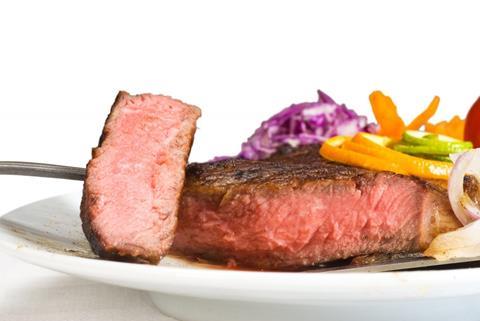New research conducted by Mintel has found that 28% of meat-eating Brits have reduced or limited their meat consumption in the six months to March, with a further 14% of adults also saying they are interested in limiting or reducing their consumption of meat or poultry in the future.

According to Mintel, 9% of Brits surveyed said they do not eat red meat or poultry, with Brits under the age of 25 being twice as likely to be non-meat eaters, as 19% of this age group said they do not eat red meat or poultry, with women accounting for 25% of the category.
A belief amongst some consumers that eating less meat is more healthy was attributed as the main reason for 49% of Brits interested or who are already limiting or reducing meat consumption, with weight management being the second most popular, at 29%.
Concerns over animal welfare and the environment each resonated with 24% of Mintel’s respondents.
In the non-meat eating category, animal welfare is the number one reason for giving up meat for 54% of respondents, however, environmental benefits was found to be the leading factor for the category’s under-25s.
According to Mintel, this group is the only one more likely to avoid meat for environmental reasons, at 29%, as opposed to concerns over animal welfare, at 22%.
Emma Clifford, senior food analyst at Mintel, said: “The ethical card in terms of helping to maintain a green planet is a powerful one for meat-free brands to play, particularly now that the issue is attracting a lot of attention.
“Flagging up that consumers are making a choice which is good for the environment and which can help to create a greener future in the long-term is likely to be a persuasive selling point.”
Media influence
Mintel’s research has also indicated that meat reduction campaigns have in part influenced eating habits, as 39% of meat limiters or reducers say that campaigns, such as Meat-free Mondays, have made them more aware of the benefits of eating less meat
Online bloggers and vloggers were also shown to have some impact, as 16% of respondents said that advice from healthy-eating bloggers, such as Deliciously Ella, is encouraging them to reduce the amount of meat they eat, rising to 29% of those who have already reduced or limited their meat consumption.
Clifford added: “The flexitarian trend carves a very accessible and unrestricted middle ground between simply meat-eaters and non-meat eaters, while acknowledging a conscious effort to eat less meat.”
In the meantime, volume sales in the meat-free foods market grew 2% year-on-year, while rising average prices saw value sales jump 4% to £559 million.
Overall, 50% of UK adults in the Mintel research have eaten meat-free foods in the six months to March, with 38% having eaten vegetable-based products, 32% bean-based products and 26% nut-based products.
This story was originally published on a previous version of the Meat Management website and so there may be some missing images and formatting issues.












